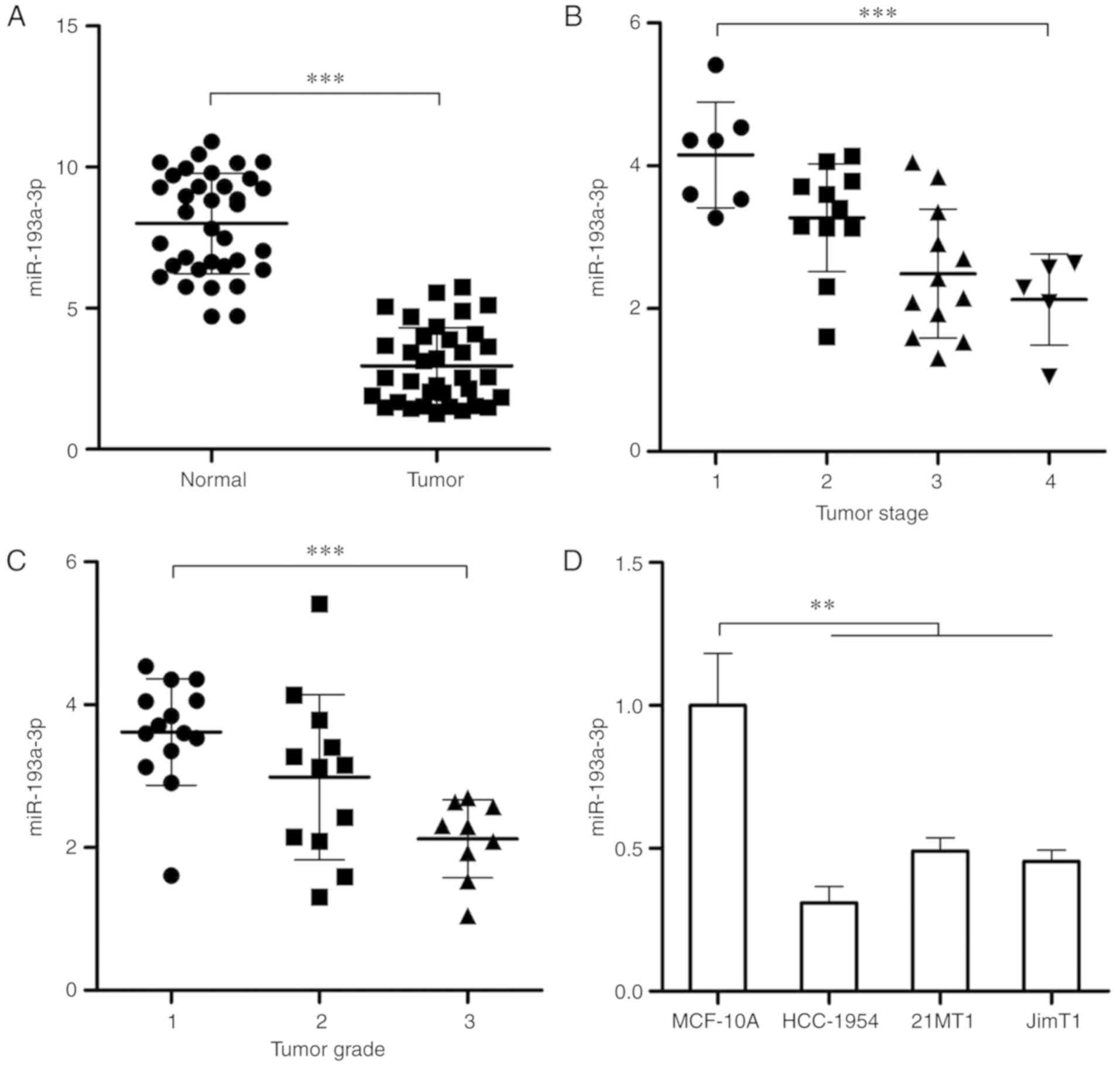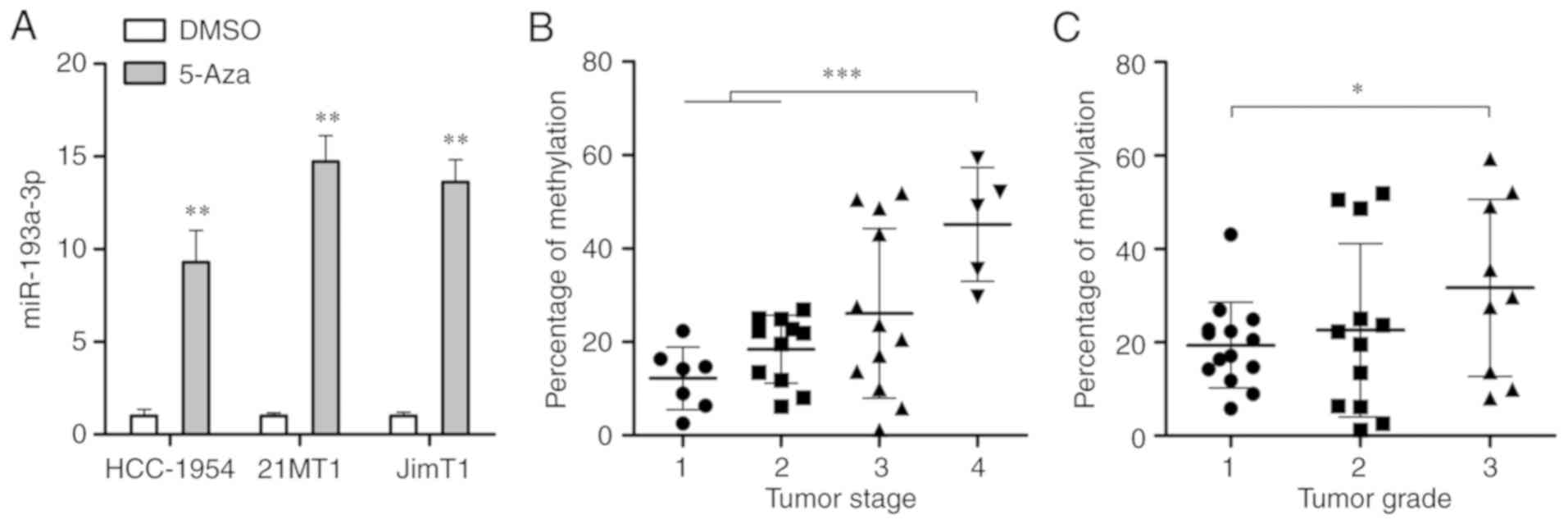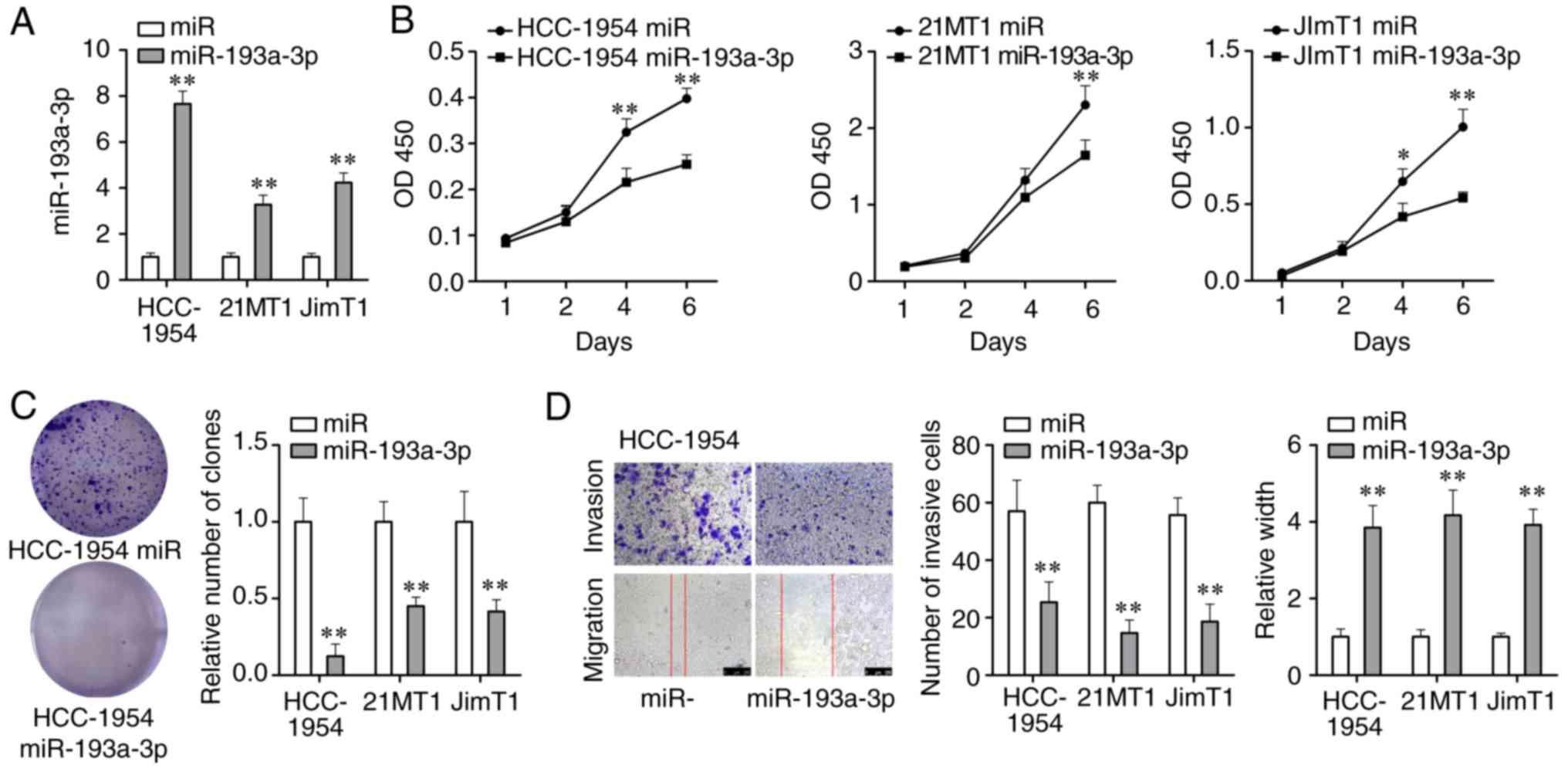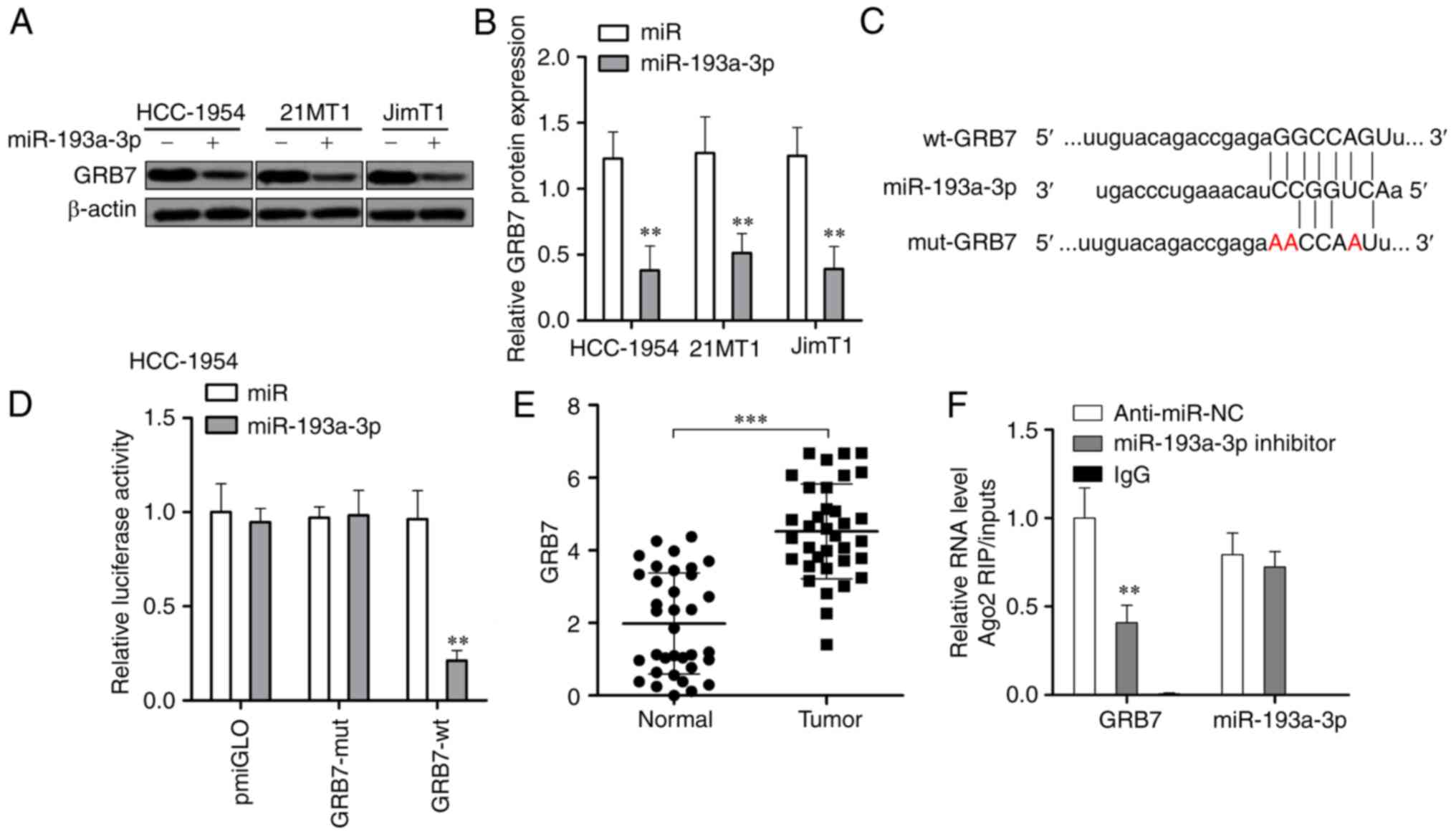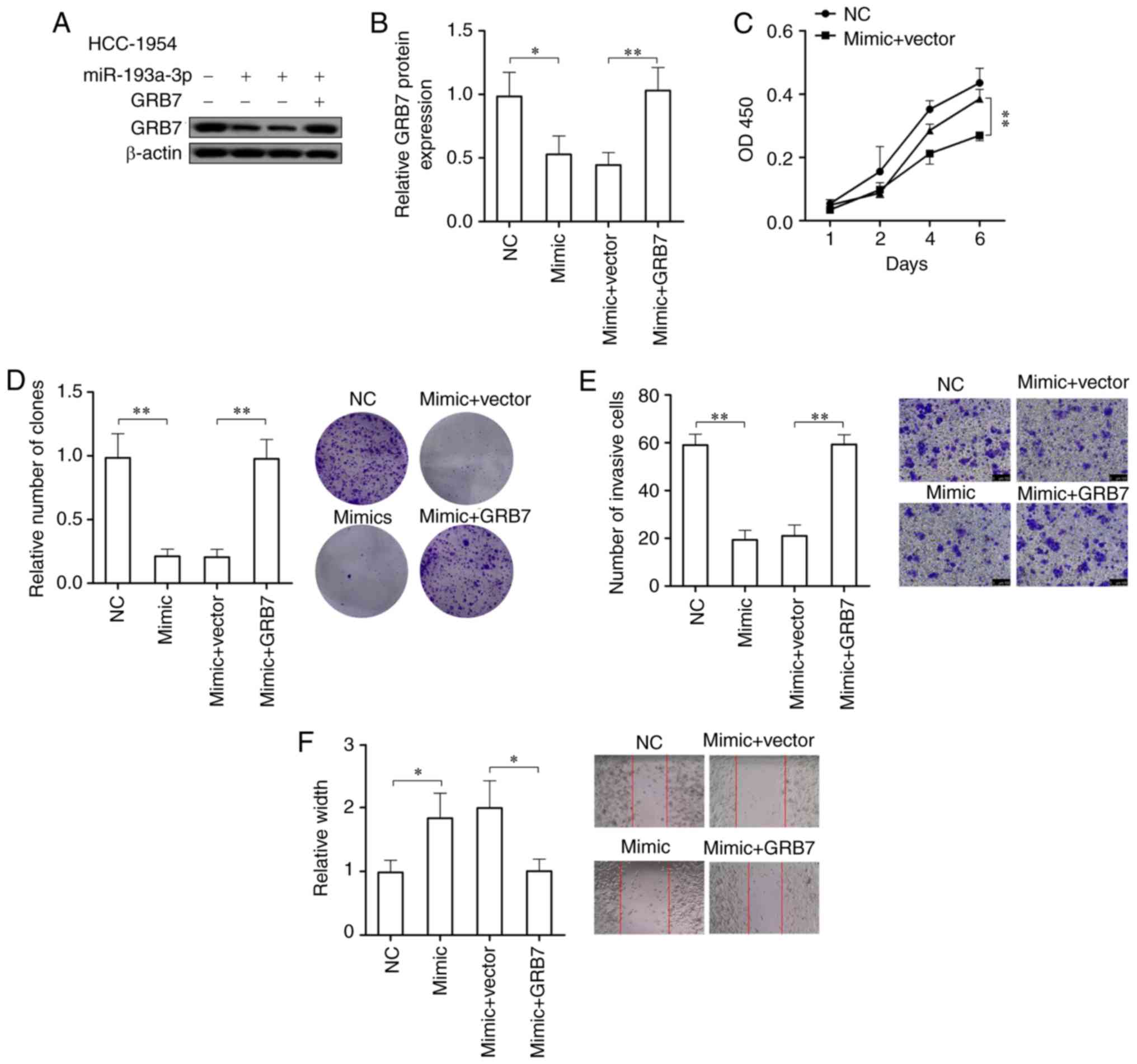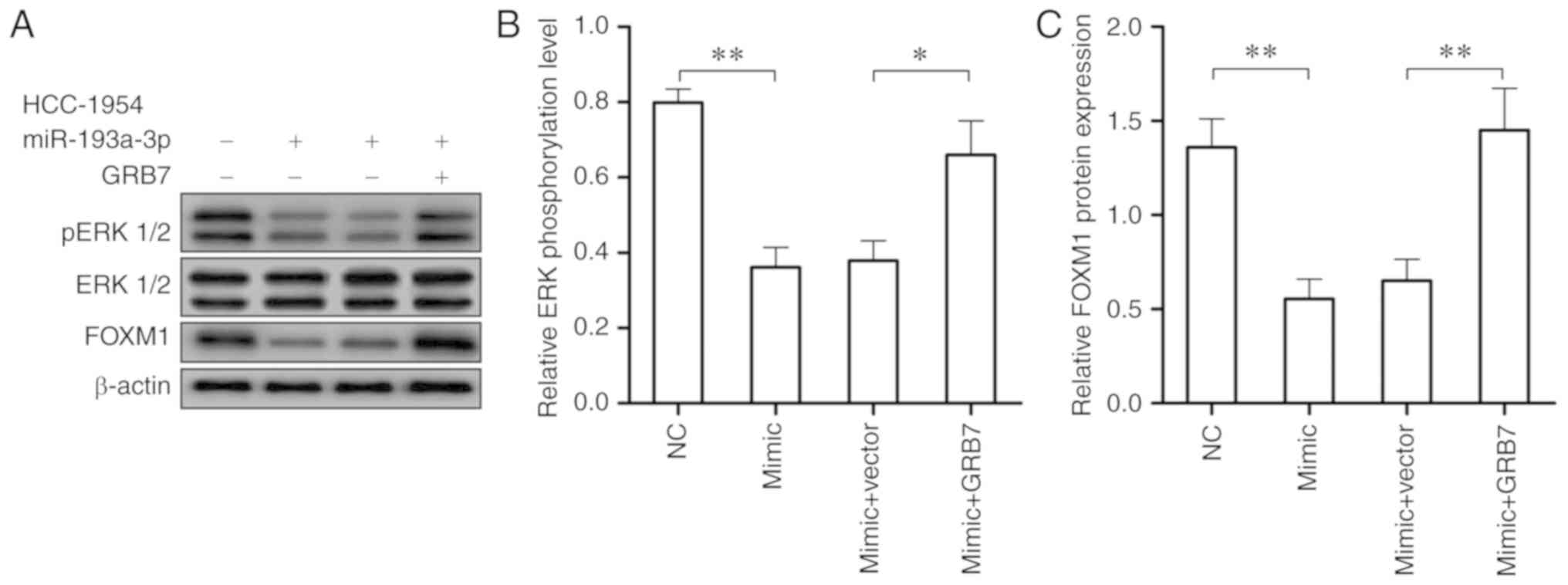|
1
|
Siegel RL, Miller KD and Jemal A: Cancer
statistics, 2018. CA Cancer J Clin. 68:7–30. 2018. View Article : Google Scholar : PubMed/NCBI
|
|
2
|
Spizzo G, Obrist P, Ensinger C, Theurl I,
Dünser M, Ramoni A, Gunsilius E, Eibl G, Mikuz G and Gastl G:
Prognostic significance of Ep-CAM AND Her-2/neu overexpression in
invasive breast cancer. Int J Cancer. 98:883–888. 2002. View Article : Google Scholar : PubMed/NCBI
|
|
3
|
Walker RA: Immunohistochemical markers as
predictive tools for breast cancer. J Clin Pathol. 61:689–696.
2008. View Article : Google Scholar
|
|
4
|
Dunnwald LK, Rossing MA and Li CI: Hormone
receptor status, tumor characteristics, and prognosis: A
prospective cohort of breast cancer patients. Breast Cancer Res.
9:R62007. View
Article : Google Scholar : PubMed/NCBI
|
|
5
|
Iqbal N and Iqbal N: Human epidermal
growth factor receptor 2 (HER2) in cancers: Overexpression and
therapeutic implications. Mol Biol Int. 2014:8527482014. View Article : Google Scholar : PubMed/NCBI
|
|
6
|
Roy AJ, Yankee RA, Brivkalns A and Fitch
M: Viability of granulocytes obtained by filtration leukapheresis.
Transfusion. 15:539–547. 1975. View Article : Google Scholar : PubMed/NCBI
|
|
7
|
Singh R, Gupta S, Pawar SB, Pawar RS,
Gandham SV and Prabhudesai S: Evaluation of ER, PR and HER-2
receptor expression in breast cancer patients presenting to a semi
urban cancer centre in Western India. J Cancer Res Ther. 10:26–28.
2014. View Article : Google Scholar : PubMed/NCBI
|
|
8
|
Kim JY, Jung WH and Koo JS: Expression of
autophagy-related proteins according to androgen receptor and HER-2
status in estrogen receptor-negative breast cancer. PLoS One.
9:e1056662014. View Article : Google Scholar : PubMed/NCBI
|
|
9
|
Slamon DJ, Godolphin W, Jones LA, Holt JA,
Wong SG, Keith DE, Levin WJ, Stuart SG, Udove J and Ullrich A:
Studies of the HER-2/neu proto-oncogene in human breast and ovarian
cancer. Science. 244:707–712. 1989. View Article : Google Scholar : PubMed/NCBI
|
|
10
|
Thompson SK, Sullivan TR, Davies R and
Ruszkiewicz AR: Her-2/neu gene amplification in esophageal
adenocarcinoma and its influence on survival. Ann Surg Oncol.
18:2010–2017. 2011. View Article : Google Scholar : PubMed/NCBI
|
|
11
|
Sahlberg KK, Hongisto V, Edgren H, Mäkelä
R, Hellström K, Due EU, Moen Vollan HK, Sahlberg N, Wolf M,
Børresen- Dale AL, et al: The HER2 amplicon includes several genes
required for the growth and survival of HER2 positive breast cancer
cells. Mol Oncol. 7:392–401. 2013. View Article : Google Scholar
|
|
12
|
Kauraniemi P and Kallioniemi A: Activation
of multiple cancer-associated genes at the ERBB2 amplicon in breast
cancer. Endocr Relat Cancer. 13:39–49. 2006. View Article : Google Scholar : PubMed/NCBI
|
|
13
|
Valastyan S: Roles of microRNAs and other
non-coding RNAs in breast cancer metastasis. J Mammary Gland Biol
Neoplasia. 17:23–32. 2012. View Article : Google Scholar : PubMed/NCBI
|
|
14
|
Zhang N, Wang X, Huo Q, Sun M, Cai C, Liu
Z, Hu G and Yang Q: MicroRNA-30a suppresses breast tumor growth and
metastasis by targeting metadherin. Oncogene. 33:3119–3128. 2014.
View Article : Google Scholar
|
|
15
|
Gregory PA, Bert AG, Paterson EL, Barry
SC, Tsykin A, Farshid G, Vadas MA, Khew-Goodall Y and Goodall GJ:
The miR-200 family and miR-205 regulate epithelial to mesenchymal
transition by targeting ZEB1 and SIP1. Nat Cell Biol. 10:593–601.
2008. View
Article : Google Scholar : PubMed/NCBI
|
|
16
|
Pekow J, Meckel K, Dougherty U, Huang Y,
Chen X, Almoghrabi A, Mustafi R, Ayaloglu-Butun F, Deng Z, Haider
HI, et al: miR-193a-3p is a key tumor suppressor in ulcerative
colitis-associated colon cancer and promotes carcinogenesis through
upregulation of IL17RD. Clin Cancer Res. 23:5281–5291. 2017.
View Article : Google Scholar : PubMed/NCBI
|
|
17
|
Chou NH, Lo YH, Wang KC, Kang CH, Tsai CY
and Tsai KW: MiR-193a-5p and -3p play a distinct role in gastric
cancer: miR-193a-3p suppresses gastric cancer cell growth by
targeting ETS1 and CCND1. Anticancer Res. 38:3309–3318. 2018.
View Article : Google Scholar : PubMed/NCBI
|
|
18
|
Bivin WW, Yergiyev O, Bunker ML, Silverman
JF and Krishnamurti U: GRB7 expression and correlation with HER2
amplification in invasive breast carcinoma. Appl Immunohistochem
Mol Morphol. 25:553–558. 2017. View Article : Google Scholar
|
|
19
|
Nadler Y, González AM, Camp RL, Rimm DL,
Kluger HM and Kluger Y: Growth factor receptor-bound protein-7
(Grb7) as a prognostic marker and therapeutic target in breast
cancer. Ann Oncol. 21:466–473. 2010. View Article : Google Scholar :
|
|
20
|
Lesurf R, Griffith OL, Griffith M, Hundal
J, Trani L, Watson MA, Aft R, Ellis MJ, Ota D, Suman VJ, et al:
Genomic characterization of HER2-positive breast cancer and
response to neoadjuvant trastuzumab and chemotherapy-results from
the ACOSOG Z1041 (Alliance) trial. Ann Oncol. 28:1070–1077. 2017.
View Article : Google Scholar : PubMed/NCBI
|
|
21
|
Lujambio A, Ropero S, Ballestar E, Fraga
MF, Cerrato C, Setién F, Casado S, Suarez-Gauthier A,
Sanchez-Cespedes M, Git A, et al: Genetic unmasking of an
epigenetically silenced microRNA in human cancer cells. Cancer Res.
67:1424–1429. 2007. View Article : Google Scholar : PubMed/NCBI
|
|
22
|
Saito Y, Liang G, Egger G, Friedman JM,
Chuang JC, Coetzee GA and Jones PA: Specific activation of
microRNA-127 with down-regulation of the proto-oncogene BCL6 by
chromatin-modifying drugs in human cancer cells. Cancer Cell.
9:435–443. 2006. View Article : Google Scholar : PubMed/NCBI
|
|
23
|
Yang H, Kong W, He L, Zhao JJ, O'Donnell
JD, Wang J, Wenham RM, Coppola D, Kruk PA, Nicosia SV, et al:
MicroRNA expression profiling in human ovarian cancer: miR-214
induces cell survival and cisplatin resistance by targetin PTEN.
Cancer Res. 68:425–433. 2008. View Article : Google Scholar : PubMed/NCBI
|
|
24
|
Fan Q, Hu X, Zhang H, Wang S, Zhang H, You
C, Zhang CY, Liang H, Chen X and Ba Y: MiR-193a-3p is an important
tumour suppressor in lung cancer and directly targets KRAS. Cell
Physiol Biochem. 44:1311–1324. 2017. View Article : Google Scholar : PubMed/NCBI
|
|
25
|
Wang Y, Chan DW, Liu VW, Chiu P and Ngan
HY: Differential functions of growth factor receptor-bound protein
7 (GRB7) and its variant GRB7v in ovarian carcinogenesis. Clin
Cancer Res. 16:2529–2539. 2010. View Article : Google Scholar : PubMed/NCBI
|
|
26
|
Mak CS, Yung MM, Hui LM, Leung LL, Liang
R, Chen K, Liu SS, Qin Y, Leung TH, Lee KF, et al: MicroRNA-141
enhances anoikis resistance in metastatic progression of ovarian
cancer through targeting KLF12/Sp1/survivin axis. Mol Cancer.
16:112017. View Article : Google Scholar : PubMed/NCBI
|
|
27
|
Stein D, Wu J, Fuqua SA, Roonprapunt C,
Yajnik V, D'Eustachio P, Moskow JJ, Buchberg AM, Osborne CK and
Margolis B: The SH2 domain protein GRB-7 is co-amplified,
overexpressed and in a tight complex with HER2 in breast cancer.
EMBO J. 13:1331–1340. 1994. View Article : Google Scholar : PubMed/NCBI
|
|
28
|
Lamy PJ, Fina F, Bascoul-Mollevi C,
Laberenne AC, Martin PM, Ouafik L and Jacot W: Quantification and
clinical relevance of gene amplification at chromosome 17q12-q21 in
human epidermal growth factor receptor 2-amplified breast cancers.
Breast Cancer Res. 13:R152011. View
Article : Google Scholar : PubMed/NCBI
|
|
29
|
Bai T and Luoh SW: GRB-7 facilitates
HER-2/Neu-mediated signal transduction and tumor formation.
Carcinogenesis. 29:473–479. 2008. View Article : Google Scholar
|
|
30
|
Meng F, Qian L, Lv L, Ding B, Zhou G,
Cheng X, Niu S and Liang Y: miR-193a-3p regulation of
chemoradiation resistance in oesophageal cancer cells via the PSEN1
gene. Gene. 579:139–145. 2016. View Article : Google Scholar : PubMed/NCBI
|
|
31
|
Nie W, Ge HJ, Yang XQ, Sun X, Huang H, Tao
X, Chen WS and Li B: LncRNA-UCA1 exerts oncogenic functions in
non-small cell lung cancer by targeting miR-193a-3p. Cancer Lett.
371:99–106. 2016. View Article : Google Scholar
|
|
32
|
Cui X, Chen X, Wang W, Chang A, Yang L,
Liu C, Peng H, Wei Y, Liang W, Li S, et al: Epigenetic silencing of
miR-203 in Kazakh patients with esophageal squamous cell carcinoma
by MassARRAY spectrometry. Epigenetics. 12:698–707. 2017.
View Article : Google Scholar : PubMed/NCBI
|
|
33
|
Liang G and Weisenberger DJ: DNA
methylation aberrancies as a guide for surveillance and treatment
of human cancers. Epigenetics. 12:416–432. 2017. View Article : Google Scholar : PubMed/NCBI
|
|
34
|
Chen K, Liu MX, Mak CS, Yung MM, Leung TH,
Xu D, Ngu SF, Chan KK, Yang H, Ngan HY and Chan DW:
Methylation-associated silencing of miR-193a-3p promotes ovarian
cancer aggressiveness by targeting GRB7 and MAPK/ERK pathways.
Theranostics. 8:423–436. 2018. View Article : Google Scholar :
|
|
35
|
De Luca A, Maiello MR, D'Alessio A,
Pergameno M and Normanno N: The RAS/RAF/MEK/ERK and the PI3K/AKT
signalling pathways: Role in cancer pathogenesis and implications
for therapeutic approaches. Expert Opin Ther Targets. 16(Suppl 2):
S17–S27. 2012. View Article : Google Scholar : PubMed/NCBI
|
|
36
|
Chu PY, Li TK, Ding ST, Lai IR and Shen
TL: EGF-induced Grb7 recruits and promotes Ras activity essential
for the tumorigenicity of Sk-Br3 breast cancer cells. J Biol Chem.
285:29279–29285. 2010. View Article : Google Scholar : PubMed/NCBI
|
|
37
|
Laoukili J, Stahl M and Medema RH: FoxM1:
At the crossroads of ageing and cancer. Biochim Biophys Acta.
1775:92–102. 2007.
|
|
38
|
Lüscher-Firzlaff JM, Lilischkis R and
Lüscher B: Regulation of the transcription factor FOXM1c by Cyclin
E/CDK2. FEBS Lett. 580:1716–1722. 2006. View Article : Google Scholar : PubMed/NCBI
|
|
39
|
Major ML, Lepe R and Costa RH: Forkhead
box M1B transcriptional activity requires binding of Cdk-cyclin
complexes for phosphorylation-dependent recruitment of p300/CBP
coactiva-tors. Mol Cell Biol. 24:2649–2661. 2004. View Article : Google Scholar : PubMed/NCBI
|
|
40
|
Francis RE, Myatt SS, Krol J, Hartman J,
Peck B, McGovern UB, Wang J, Guest SK, Filipovic A, Gojis O, et al:
FoxM1 is a downstream target and marker of HER2 overexpression in
breast cancer. Int J Oncol. 35:57–68. 2009.PubMed/NCBI
|















